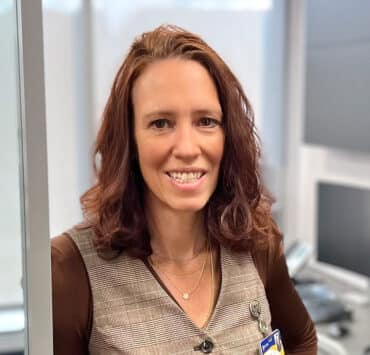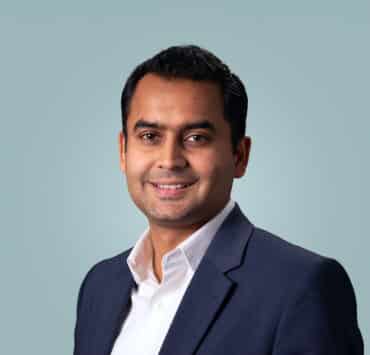Healthcare is a diverse field with many different roles, each one carrying large responsibilities and facing unique challenges. As a result, organizations have turned to innovative thinkers, who can not only understand the respective needs of their colleagues but who can find forward thinking solutions.
As director of innovation, Michael Latchmansingh draws from his diverse background in nursing, law, workstream analysis, and clinical risk management to help the 292-bed nonprofit find startups that can address its most pressing pain points. Stepping into the role of leading the department in 2023, after joining the department in 2021, was a full circle moment for Latchmansingh, who was born in India, raised in Poland, and now lives in New York.
“I feel so grateful and almost stunned that I managed to find a role that not only leverages all of my education, but my past life experiences every single day,” says Latchmansingh, who has a nursing degree from Binghamton University, an MBA from Clarkson University, and a law degree from the Albany Law School.
He continues, “When structuring an equity note, it is beneficial to have my law degree and to have taken securities courses. When trying to figure out what a department’s needs are, it is incredibly helpful to have a background working as a nurse in that setting. And when figuring out how to budget or create a business plan, that is where I rely on my experience obtaining an MBA.”
Latchmansingh spends his time searching for and evaluating startups that can help advance White Plains Hospital’s goals and address operational pain points. When potential partners are identified, Latchmansingh and his colleagues structure a pilot program to beta test the organization’s services with staff or patients. From there, the leader structures and manages transactions with the service providers.
Right now, the hospital, through its investing arm, East Post Road Ventures, has made investments in twelve startups, each in various stages of deployment. Lazarus 3D, which helps physicians practice on realistic copies of patients’ organs, is one of them. White Plains Hospital uses the technology in its simulation laboratory, where individuals can simulate orthopedic and neurosurgical procedures. The technology is especially important for high-risk and low-frequency medical scenarios, Latchmansingh explains.
“The technology allows us to enhance quality of care in the institution,” he says. “[Doctors] might only see five of these specific cases in a year, so it makes sense to have our physicians be as sharp as possible by simulating on these 3D organs.”
White Plains Hospital has also invested in remote patient monitoring platform Life365. When qualifying patients are discharged after being treated for an exacerbated chronic condition like congestive heart failure (CHF) or chronic obstructive pulmonary disease (COPD), they are enrolled in the hospital’s remote patient monitoring program, WPH Cares. Patients can then receive Life365 devices, including a blood pressure monitor, a weight scale, and pulse oximeter. Life365 not only monitors patient vital signs remotely but in conjunction with WPH Cares, the remote monitoring team communicates with the primary care providers, if any action needs to be taken.
“I feel so grateful and almost stunned that I managed to find a role that not only leverages all of my education, but my past life experiences every single day.”
Michael Latchmansingh
Pairing the right problem to the right solution isn’t easy, the leader admits, especially since he is a one-person department. But he navigates the complexities of the job by building relationships and putting in the time.
“The stars have to align a bit,” he says. “I’ve probably reviewed thousands of companies just to get to the twelve we have. However, reaching out to angel investor groups, going to annual conferences and bringing our priorities to a sourcing firm we work with has been huge in helping us find the best startups.”
Another startup Latchmansingh brought to White Plains is SmarterDx. Co-founder and CEO Dr. Michael Gao says Latchmansingh’s dedication is inspiring. “Michael is deeply committed to creating value for his hospital and has a unique ability to identify not just which solutions are innovative but also which have a clear value proposition. He cuts through the noise to find solutions likely to be successful and sustainable.”
Before White Plains, Latchmansingh had a winding career journey that saw him work as an EMT-B, a law clerk for the New York State Office of the Medicaid Inspector General, an assistant director of sterilization for the VA, and an assistant director of Risk and Patient Safety for multiple healthcare systems. That’s why he advises young professionals to be patient on their paths to success, pointing to his career as a prime example. Where you’re meant to be doesn’t always happen right away, he says.
“If you include my EMT-B years in college, I’ve been working for twenty years in various healthcare settings before working in innovation,” Latchmansingh says. “Be patient and if you have a good reputation in your organization, other leaders will take the risk and encourage your growth by letting you observe or even try other roles. That’s what happened to me. While it took over a decade, I wouldn’t trade those experiences for anything.”
SmarterDx is the clinical AI company that discovers, delivers and drives better quality, revenue and care. We use AI to understand each patient’s journey, helping hospitals tell the most accurate and complete patient story to close their revenue integrity “differential” gap. The ability to implement in weeks, ingest more than 30,000 data points per chart and deliver a risk-free 5:1 ROI makes SmarterDx the ultimate hospital revenue integrity partner. We’re proud to be that partner for Michael Latchmansingh and White Plains Hospital. With SmarterDx, WPH has realized millions in net new revenue, improved measures of quality and empowered its CDI team.


